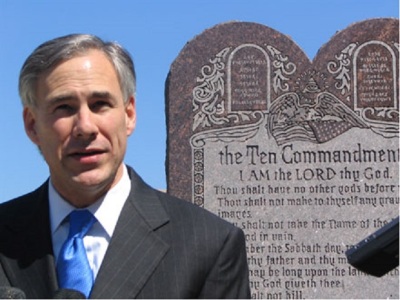Texas AG to Houston city attorney: Don't mess with Texans' religious liberty

AUSTIN, Texas (Christian Examiner)—Attorney General of Texas Greg Abbott sent a strongly worded letter Oct. 15 to Houston City Attorney David Feldman telling him to withdraw subpoenas served to city pastors demanding they turn over sermons and notes which mention the mayor or a recently passed city ordinance referred to as the "bathroom bill" by opponents.
Promoted as protecting transgender rights, the ordinance allows any person to use any public bathroom—biological men in women's restrooms and vice versa.
Abbott told Feldman he had violated the constitutional rights of the pastors, calling the subpoenas "a direct assault on the religious liberty guaranteed by the First Amendment."
Houston Mayor Annise D. Parker is a lesbian and has publicly pushed for gay, lesbian, bisexual and transgender rights, including this bill which the city council passed in June.
Opponents gathered more than 50,000 signatures of registered Houston voters, almost three times the 17,269 needed to place the matter on the November ballot as a referendum on whether the ordinance should be repealed or not. However, city officials threw out the petition in August with Feldman commenting the petitions included "too many documents with irregularities and problems to overlook."
The petitioners subsequently filed a lawsuit challenging the city's actions, and the subpoenas followed—although none of the subpoenaed pastors is a plaintiff in the litigation against the city.
"The people of Houston and their religious leaders must be absolutely secure in the knowledge that their religious affairs are beyond the reach of the government," Abbott wrote. "Nothing short of an immediate reversal by your office will provide that security."
Parker and Feldman are claiming they did not know about the subpoenas, saying pro bono lawyers working on behalf of the city filed them. They further said the actions were not an attempt to bully or intimidate but to find out what instructions the pastors had given congregants regarding how to fill out petitions—describing the supbpoenas as a means of discovery for responding to the lawsuit against the city.
Parker tweeted late Oct. 14, "If the 5 pastors used pulpits for politics, their sermons are fair game. Were instructions given on filling out anti-HERO petition?" HERO stands for Houston Equal Rights Ordinance.
But Abbott rejected this position, arguing the litigation discovery process "is not a license for government officials to inquire into religious affairs."
"No matter what public policy is at stake, government officials must exercise the utmost care when our work touches on religious liberty," he continued. "If we err, it must be on the side of preserving the autonomy of religious institutions and the liberty of religious believers."
Abbott called the subpoenas "aggressive and invasive" and said they represented disregard for First Amendment rights.
He also chided Feldman for placing blame on outside lawyers, telling him "these lawyers acted in the City's name, and you are responsible for their actions."
Ultimately, he asked Feldman to show a spirit of diversity that includes people of faith.
"I urge you to demonstrate the City's commitment to religious liberty and to true diversity of belief by unilaterally withdrawing these subpoenas immediately."
Both Feldman and Parker have stated they believe the subpoenas are too broad and promised to narrow the focus of the discovery.